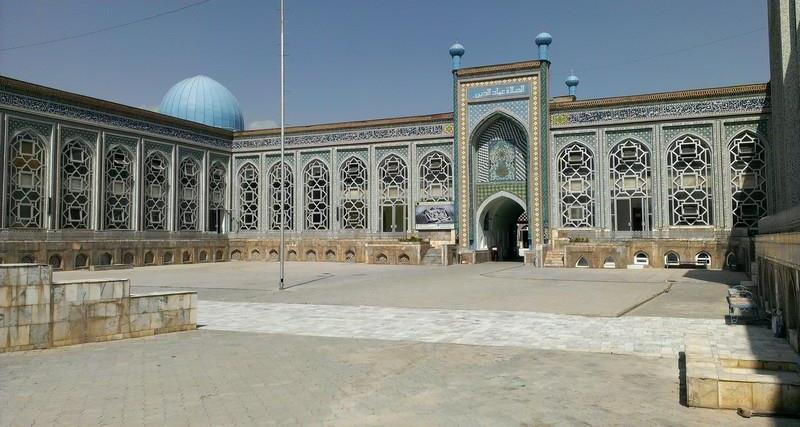Recently, a video was posted in social networks, filmed by the worshipers of the mosque in the village of Choryakkoron in the Rudaki district. The video recording caused a great resonance in the media and gave rise to resentment among the residents of the country because it shows how one of the Tajik officials, who was in the courtyard of the mosque, insulted the worshippers with obscene words and demanded the closure of the mosque.
The video shows the official, referring to one of the men who was outraged by the demand to close the mosque, shouting: “If you make me nervous once again,[expletives]!” Then another man, addressing the official, said: “What if I tell the authorities about this? I will say that you came and insulted the whole mahalla with such words? Will you answer for your words?”. To that the official replied: “Yes, I will! Close the mosque, otherwise I will [expletives] And so will your mahalla…! I have already warned you for 6 months”. The worshipers in the video said that they will appeal to the authorities with a complaint against him in reply to which the official says: “Go and complain where you want! I will declare you all Salafis!” One of the participants of the incident claims on the video that the official is in a drunken state.
After the event went public, the head of the Religious Organizations Department of the Committee for Religious Affairs and Ordering Traditions under the Government of Tajikistan told reporters that an investigation was being conducted against the incident and that the identity of the official was established – the chief specialist of the department for regulating the traditions and rites of the village of Chorjakkoron district of Rudaki Shokirjon Kholdorov is on the video.
It should be noted that this insulting attitude by Tajik officials towards the Tajik citizens practicing their religion is not fixed for the first time. And each time after the resonance, the authorities “conduct an investigation”, i.e., in every possible way they pretend that this or that incident happens by chance or by a personal error of one or another official. Are such situations really incidents or regularities?
In fact, for anyone who closely follows the events in Tajikistan, it is obvious that insults towards Islam have become the norm by high-ranking officials right up to President Rahmon today. The only difference is that publicly high-ranking officials of the regime insult Islam in a veiled manner, subjecting various attributes, laws and values of Islam to insinuations – whether it be Rahmon’s statement that the hajj is optional for certain categories of people, or the statement of the head of the women’s committee, Idigul Kosimzoda, about the depravity of women in hijabs. At the same time, on the sidelines, according to available information, they are not shy in the expressions with their subordinates, calling the citizens practicing Islam just as using abusive words. And it is natural that many junior officials and security officials, seeing such public and non-public attitude on the part of the leadership, are trying their best to curry favor with their superiors, and sometimes such incidents occur when this or that junior official reveals to the people how Rahmon and his henchmen speak of them.
Therefore, people should not be deceived by the empty (and, by the way, never-realized) promises to “punish” the offender, thinking that “the king is good, but the boyars (lords) are bad”. Let the people of Tajikistan know that it is not a petty official who threatens them with abusive words, it is Rahmon’s regime and Rahmon himself who threaten them with obscene words.
When they closed our mosques, many were silent; when they took off the hijabs from our wives and daughters, many were silent; when they deprived our sons of freedom, many were silent. Now they are threatening us with obscene words! What will happen tomorrow with further silence of the people? Why are we silent? The Messenger of Allah (saw) said:
«من رأى منكم منكراً فليغيره بيده، فإن لم يستطع فبلسانه فإن لم يستطع فبقلبه وذلك أضعف الإيمان»
“Whosoever of you sees an evil action, he must change it with his hand. If he is not able to do so, then (he must change it) with his tongue. If he is not able to do so then (he must change it) with his heart and this is the weakest (manifestation) of faith.” (Muslim)
Today, Rahmon’s regime, like many other regimes, is carrying out a policy of suppressing dissent and Islamic awakening among the population, thereby intimidating the inhabitants of Tajikistan and forcing them to remain silent about injustice. And, unfortunately, many people succumb to these intimidations, fearing negative consequences for themselves. In fact, the regime fears the people to death; a resurgence of indignation and disagreement on the part of people which can put an end to the rule of the tyrannical regime. It is the fear of the people and the desire to preserve power in the country that make the Islamic awakening occurring everywhere, including in Tajikistan the main threat to Rahmon’s regime.
Publicizing such cases of attacks on Islam and its values, as the musaleen of the mosque in Rudaki made, the courageous actions of Mukhabbathon Davlatova and Nargis Kurbanova, who repulsed the security forces when they attempted to take their hijab off, attracting media attention and disseminating information in social networks – all this can play a serious role today in the matter of protecting Muslims’ religion, preserving its values and its rights.
Firdavs Salimzoda

